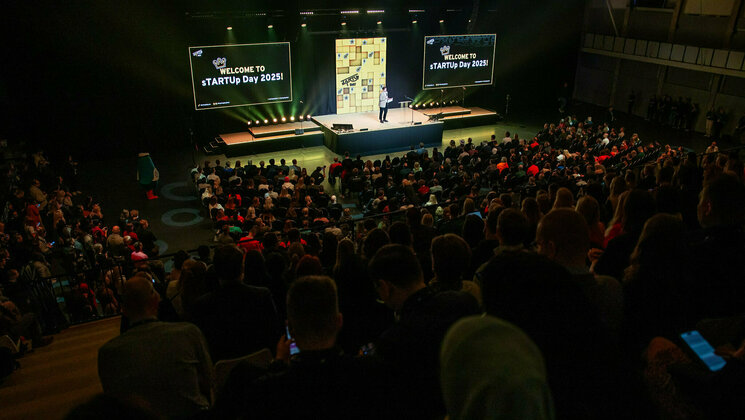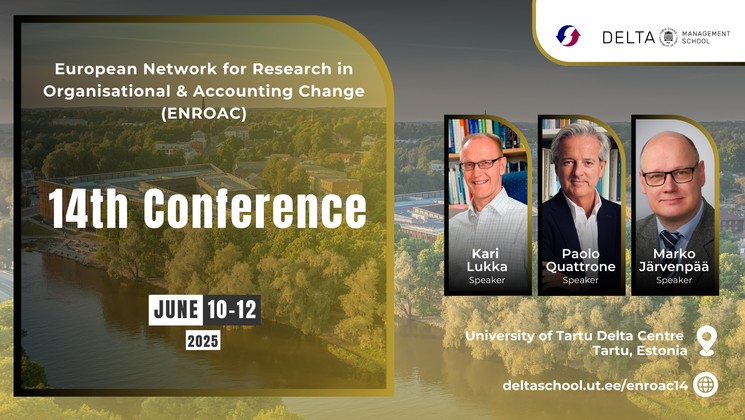University brings top professionals and future technologies to Ida-Viru County

Alongside the creation of new technologies, Ida-Virumaa's transition to a sustainable economic model requires diversified skills and support for the development of research-intensive businesses. Closer cooperation between research institutions and companies operating in the region is a prerequisite for this, according to the opinions exchanged in a recent seminar in Narva between research groups from the University of Tartu and the region's just transition leaders.
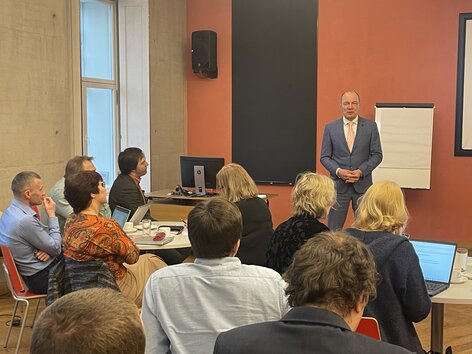
While in 2018 people were quite convinced that the oil shale energy industry operating in Ida-Viru County could continue operating as usual for years to come, the CO2 quota price, which took a big leap in 2019, gave a clear signal that the county needs an exit strategy from the oil shale-centric industry. According to Hardi Murula, development specialist of the Association of Local Authorities of Ida-Viru County, a good plan is still underway both at county and national level. The region's population has declined by almost a third in the last few decades. Murula cited the fact that young people in the region do not want to tie their future to the oil shale industry as a major reason for emigration.
Jaanus Purga, representative of the Government of the Republic of Ida-Viru County, says the future requires a more diverse workforce. This is why it is important that the training offered in the region is not focused on one industry. According to him, the applications for entrepreneurship support from the Just Transition Fund give hope that the industrial landscape will become much more diversified in the near future and that up to 1,500 new jobs could be created in Ida-Viru County if all the plans succeed.
Top specialists shape the technology of the future
Researchers from the 11 research groups that started work at the University of Tartu at the beginning of the year with the support of the Just Transition research measure noted that one of the greatest values the university can offer to the region is the preparation of professionals with knowledge of sustainable technologies. This concerns energy storage devices, hydrogen and circular economy technologies as well as big data analytics and robotics.
There is a good opportunity for companies to collaborate with the university, either through an industrial master’s programme or an industrial doctorate. This would allow a master’s student or doctoral student to be directed towards tackling a development task or problem by a company and to involve university researchers in finding the solution.
Professor Jaak Nerut, Professor of Electrochemistry at the University of Tartu, whose group is developing low-temperature electrolyzers and green hydrogen storage devices, gave the example of the Institute of Chemistry, which is collaborating with four companies for an industrial master’s programme. According to Nerut, it would be a good idea to involve some partners from Ida-Viru County.
Industry 5.0 to be developed in Narva
In the field of big data and robotics, the university plans to create opportunities at Narva College for both teaching and research, as well as business support services in the coming years. The director of the college, Indrek Reimand, said he was pleased that research projects are supporting both the development of existing IT applied higher education curricula and the development of a brand new master's programme in the region.
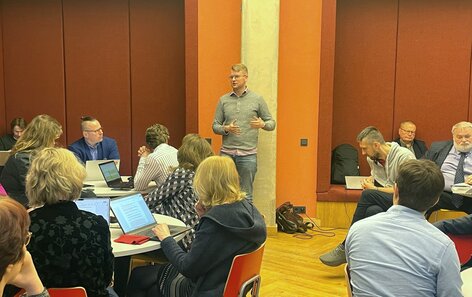
According to Karl Kruusamäe, Associate Professor of Robotics Engineering, Narva College could have a robotics laboratory by autumn 2025, providing a high-tech learning environment for students, working conditions for researchers and a service to test applications for businesses. "We are looking for solutions to support the automation needs of Estonian industry where large-scale industrial digitisation solutions are too costly and do not meet the needs of small businesses, as production volumes are often small and can change rapidly," Kruusamäe explained.
Katri Raik, representative of the University of Tartu in Ida-Viru County, added that the direct beneficiary of the research projects is the university's representative unit in Ida-Viru County, Narva College. Investment in the development of the college's IT curricula will make it possible to link teaching and research and to attract small and medium-sized enterprises to faster technological development. "This is the key to boosting the economy of Ida-Viru County," Raik said full of hope.
Extraction of rare earth elements
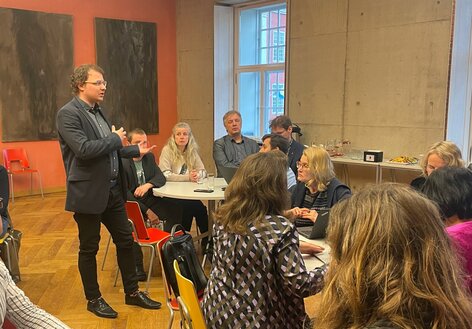
If Europe's green energy plans are put into action, demand for rare earth elements will surge in the near future. Ida-Viru County is home to one of Europe's largest rare earth factories, making the training of experts in the field strategically important not only for the region, but for Europe as a whole. Research groups led by Professor of Physical Chemistry Enn Lust, and Research Fellow Ove Oll are developing methods to extract rare earth elements from different ores.
Alongside the research, a lecture course explaining the topic has also been compiled. If there is enough interest, it will be taught this autumn semester. Students who pass the course successfully will have the opportunity to participate in the practical part of the course in spring 2025.
Analysis and valorisation of industrial waste
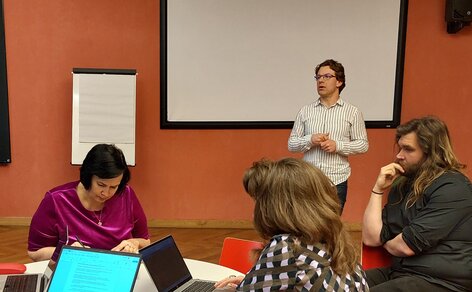
It is estimated that there is up to a billion tonnes of industrial waste in Ida-Viru County, the exact composition, location and sometimes ownership of which is often unclear. Nor has there ever been more thorough preparation for their refinement using modern technology. According to Research Fellow in Geology Riho Mõtlep, there are a number of smaller companies that would be interested in doing something with this waste, but lack the necessary technical base and skills. This is where the university can help.
The project, led by Professor of Geology and Mineralogy Kalle Kirsimäe, explores the potential applications of these wastes in the production of construction materials. Research Fellow in Geology Peeter Paaver, who presented the project in Narva, said that while the binder properties of shale ash from the old thermal power plant are relatively good, it is much more difficult to find a use for ash from the oil industry and semi-coke heaps.
Monitoring of the transition process, the innovation system and health impacts
The aim of the working group, which focuses on the monitoring of societal transitions, is to develop a sociological portrait of the population and a regional labour force projection model to help municipalities, businesses and public service providers in the region to plan their activities and make forecasts. It will also look at how to better plan access to health systems and services in one of the fastest ageing populations in Estonia.
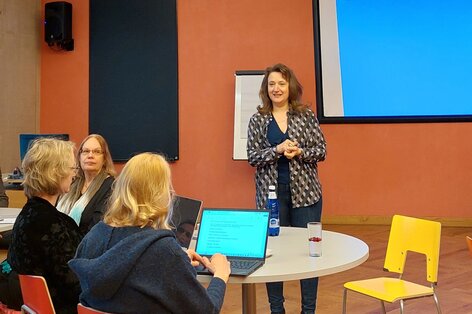
However, Professor in Research and Innovation Policy Kadri Ukrainski’s working group will focus on technological niches that could give rise to future deep tech (start-up) companies in which investors would be interested. The above-mentioned projects of the research measure will also be analysed in terms of their potential to grow into promising niche technologies. According to Ukrainski, alongside existing industry, it is crucial to support the creation of start-ups to encourage innovative thinking and research-intensive business.
Cooperation between research institutions
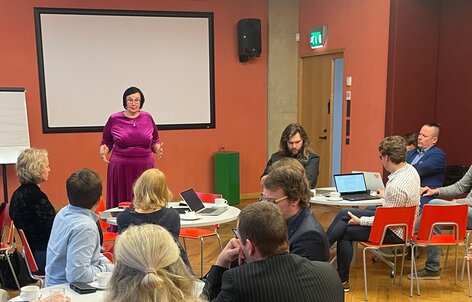
According to Katri Raik, it is a great pleasure to see the interest of researchers in Ida-Viru County and specific cooperation projects with Tallinn University of Technology. Closer cooperation between the two top Estonian universities in Ida-Viru County is one of the objectives of financing from the Just Transition Fund. "Our lecturers are about to start courses for the students of the TalTech Virumaa College. We need to capitalise on the strengths of both universities. It is exactly this funding that will support the development of new courses focused on promoting the green economy. I believe that the University of Tartu will also become a significant provider of continuing education in this field."
"Our lecturers are about to start courses for the students of the TalTech Virumaa College. We need to capitalise on the strengths of both universities. It is exactly this funding that will support the development of new courses focused on promoting the green economy."
A total of 22 research groups from Tallinn University of Technology and the University of Tartu are members of the research consortium of the Just Transition Fund. The consortium's research is funded by Estonia and the European Union through the support measure “Support for increasing the knowledge intensity of business in Ida-Viru County: developing the provision of research capacity in Ida-Viru County for the creation of a research and development network”.



